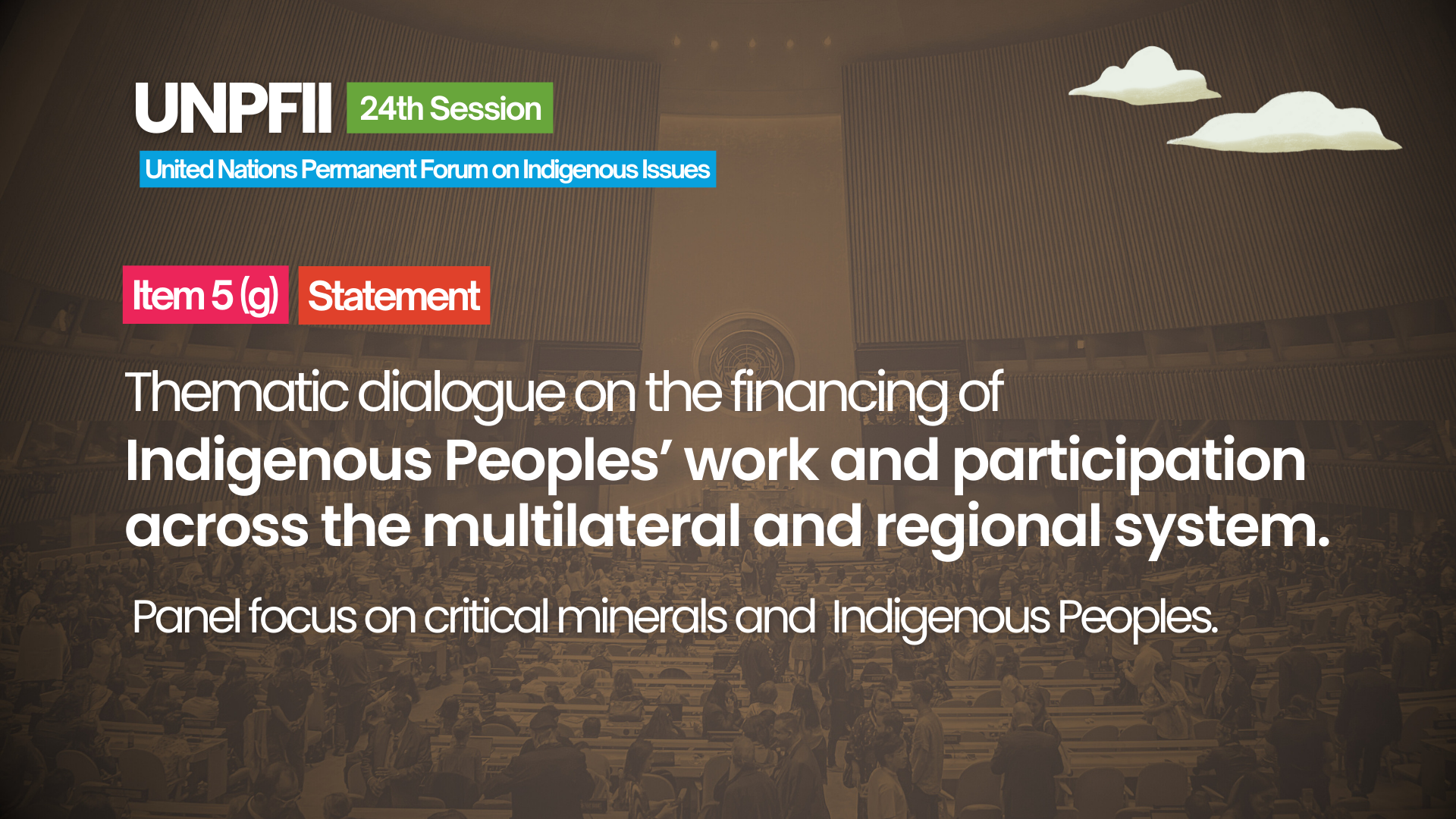Statement by Indigenous Peoples Rights International
April 22, 2025
The implementation of the United Nations Declaration on the Rights of Indigenous Peoples (UNDRIP) is necessary for ensuring the rights, dignity, and well-being of Indigenous peoples worldwide. It serves as a global framework for recognizing and protecting our collective and individual human rights, including those related to self-determination, land, culture, and participation in decision-making. The Declaration reaffirms and expands upon existing human rights standards as they apply to Indigenous peoples, ensuring they are not discriminated against, can live free from violence and oppression, can enjoy their rights to their lands, territories, and resources, ensuring they have the security and access necessary for their livelihoods and development. It emphasizes the importance of their full and effective participation in all matters that concern them, including lawmaking and policy decisions. Only through its full implementation will historical and current injustices and inequalities faced by Indigenous peoples be addressed, promoting reconciliation and creating a more just and equitable society.
The implementation of the UN Declaration on the Rights of Indigenous Peoples should occur at different levels, whether domestically, regionally, or internationally. At the international level, Article 42 specifically calls on the United Nations and its bodies to promote respect for and full application of the provisions of the Declaration and follow up on its effectiveness.
IPRI regularly monitors the work of the ten UN Treaty Bodies and of the Special Procedures of the Human Rights Council in relation with Indigenous Peoples’ human rights as enshrined in UNDRIP. We have seen a lot of progress in the way these bodies interpret fundamental human rights Treaties in the light of UNDRIP when considering indigenous rights, supporting the view expressed by the Expert Mechanism on the Rights of Indigenous Peoples (EMRIP) and others that the Declaration is “a contextualised elaboration of general human rights principles” and that the standards affirmed therein “connect to existing State obligations under international human rights law….”
This progress is reflected in our publication “A Compilation of UN Treaty Body Jurisprudence, Special Procedures of the Human Rights Council, and the Advice of the Expert Mechanism on the Rights of Indigenous Peoples”, whose most recent edition, Volume X, is now available on our website. We have also documented progress in the regional human rights bodies and in domestic courts, as reflected in our digest titled the ‘Xanharu’.
These advances are indeed important for the protection of Indigenous Peoples’ rights. We want to stress the relevance of the work of UNTBs and SPs for ensuring implementation of UNDRIP on the ground. Member States have binding obligations in regards to the human rights treaties they have signed and ratified. When TBs interpret these obligations as linked to UNDRIP implementation, they provide Indigenous Peoples with a strong basis for advocacy and protection.
It is then key that indigenous peoples themselves are aware and fully utilize this corpus of conclusions, observations and recommendations when fighting for the implementation of the rights recognized in UNDRIP. We hope IPRI monitoring work can be a useful tool for indigenous advocates and allies.
In spite of these good practices and progress within the UN human rights system and in the judiciary in many countries, challenges remain. We have seen that criminalization and violence against indigenous peoples when they try to exercise their rights is increasing in many countries in the world. Defending their self-determination and autonomy, their rights to lands, territories and resources or their right to free, prior and informed consent are still met with repression, gross violations of their human rights, criminalization under different forms and violence. In many cases, lack of recognition and implementation of indigenous rights obligates indigenous peoples to recur to courts, in spite of the obstacles they usually face to access justice. Even in the cases where positive decisions supporting their claims are achieved, States do not comply with such decisions, whose implementation can drag for decades.
Taken all these aspects into account, IPRI would like to stress the following:
- The work of UN TBs and special procedures to incorporate UNDRIP into their interpretation of the corpus of international human rights law has shown a lot of progress. It is very important that specialized UN bodies, including the UN Special Rapporteur on the rights of indigenous peoples, the EMRIP and the UNPFII, support and disseminate this work so indigenous peoples can utilize it in their advocacy for UNDRIP implementation.
- Increasing criminalization and violence against Indigenous Peoples remains one of the most concerning problems derived of the non implementation of UNDRIP. The UNGA has expressed deep concerns about the rise in discrimination, cases of threats, harassment, reprisals and murder of IPs, in particular women and girls, often with impunity, as well as land invasions, arbitrary forced evictions and other abusive practice, and stressed the need to counter them. It has also condemned the increase of cases of intimidation, harassment and reprisals against Indigenous human rights defenders and Indigenous leaders, including Indigenous women, as well as expressed concerned for reprisals against IPs representatives attending the UN meetings, including in the form of denial of VISAs and other travel restrictions. Appreciating the report the UNPFII devoted to the issue of criminalization during its 23rd session, we call the Forum to routinely consider this problem in its discussions and keep on examining ways to involve Member States, UN agencies and all actors in its solution.





